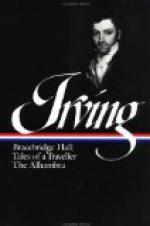He exhorted Slingsby not to break down or depress the free spirit of the boys, by harshness and slavish fear, but to lead them freely and joyously on in the path of knowledge, making it pleasant and desirable in their eyes. He wished to see the youth trained up in the manners and habitudes of the peasantry of the good old times, and thus to lay the foundation for the accomplishment of his favourite object, the revival of old English customs and character. He recommended that all the ancient holidays should be observed, and that the sports of the boys, in their hours of play, should be regulated according to the standard authorities laid down by Strutt; a copy of whose invaluable work, decorated with plates, was deposited in the school-house. Above all, he exhorted the pedagogue to abstain from the use of birch, an instrument of instruction which the good squire regards with abhorrence, as fit only for the coercion of brute natures, that cannot be reasoned with.
Mr. Slingsby has followed the squire’s instructions to the best of his disposition and abilities. He never flogs the boys, because he is too easy, good-humoured a creature to inflict pain on a worm. He is bountiful in holidays, because he loves holidays himself, and has a sympathy with the urchins’ impatience of confinement, from having divers times experienced its irksomeness during the time that he was seeing the world. As to sports and pastimes, the boys are faithfully exercised in all that are on record,—quoits, races, prison-bars, tipcat, trap-ball, bandy-ball, wrestling, leaping, and what not. The only misfortune is, that having banished the birch, honest Slingsby has not studied Roger Ascham sufficiently to find out a substitute, or rather he has not the management in his nature to apply one; his school, therefore, though one of the happiest, is one of the most unruly in the country; and never was a pedagogue more liked, or less heeded, by his disciples than Slingsby.
He has lately taken a coadjutor worthy of himself, being another stray sheep that has returned to the village fold. This is no other than the son of the musical tailor, who had bestowed some cost upon his education, hoping to see him one day arrive at the dignity of an exciseman, or at least of a parish clerk. The lad grew up, however, as idle and musical as his father; and, being captivated by the drum and fife of a recruiting party, he followed them off to the army. He returned not long since, out of money, and out at elbows, the prodigal son of the village. He remained for some time lounging about the place in half-tattered soldier’s dress, with a foraging cap on one side of his head, jerking stones across the brook, or loitering about the tavern door, a burthen to his father, and regarded with great coldness by all warm householders.
[Illustration: The Prodigal]




